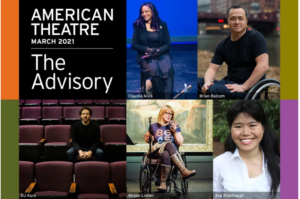This package of stories about Deaf and disabled theatre workers was only possible thanks to a deep and intentional collaboration with TCG’s Equity, Diversity, and Inclusion department, whose director, Elena Chang, and associate, Sarah Machiko Haber, recruited an extraordinary advisory panel of leaders from the Deaf and disabled community. These five folks will be talking live about this issue—and, in another sense, about many issues facing the field, March 26, at 3 p.m. ET on American Theatre‘s Offscript on Facebook.
Advisors: Claudia Alick, Ava X. Rigelhaupt,Brian Balcom, David Kurs, Regan Linton
https://www.americantheatre.org/category/special-section/disability-and-theatre/
- Practicing Disability Justice, Honoring Wholeness Onstage
- Inclusion: We Can’t Do It Alone
- The How and the What: Access, Justice, and Disability Aesthetic
- What Disability Leadership Looks Like
- Taking ADA From the Page to the Stage
- 15 Theatre Workers You Should Know
“The concept of disability justice, which infuses and animates some of the stories in the bustling new package on Disability and Theatre we’re proud to publish today (see below), has become widely embraced as a way to name and center the intersecting oppressions of multiply marginalized populations, including the disabled, Black and Indigenous populations, people of color, queer and trans and gender nonconforming folks, immigrants, and the poor. As the theatre field reckons with the demands of We See You, White American Theater and other accountability movements, it is crucial not to lose sight of the intertwined struggles for equity and inclusion waged by and on behalf of the most vulnerable and historically excluded.
One thread that comes through strongly in various pieces of this special package (whose content and tone were set in large part by an extraordinary advisory panel of leaders from the community, in partnership with TCG’s Equity, Diversity, and Inclusion department, and which is authored entirely by disabled journalists and writers) is that disabled theatre workers have for too long shouldered the labor of carving out the terms of their own access and inclusion, either individually or in networks. It has been lonely and punishing work, and it’s long past time for American theatres of all stripes to join that work, to put disabled talent and audiences at the center, not the periphery, of their missions, and to make disability justice and inclusion a core value, from their budget documents to their season brochures.”
Rob Weinert-Kendt (he/him), Editor-in-Chief

